
La favorite is a grand opera in four acts by Gaetano Donizetti to a French-language libretto by Alphonse Royer and Gustave Vaëz, based on the play Le comte de Comminges by Baculard d'Arnaud with additions by Eugène Scribe based on the story of Leonora de Guzman. The opera concerns the romantic struggles of the King of Castile, Alfonso XI, and his mistress, the "favourite" Leonora, against the backdrop of the political wiles of receding Moorish Spain and the life of the Catholic Church. It premiered on 2 December 1840 at the Académie Royale de Musique in Paris.
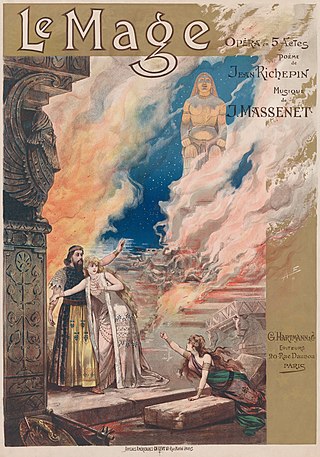
Le Mage is an opera in five acts by Jules Massenet to a French libretto by Jean Richepin. It was first performed at the Paris Opéra in Paris on 16 March 1891 in costumes by Charles Bianchini and sets by Auguste Alfred Rubé, Philippe Chaperon and Marcel Jambon, Amable and Eugène Gardy, Alfred Lemeunier, and Jean-Baptiste Lavastre and Eugène Carpezat.

Antonio Tamburini was an Italian operatic baritone.

Doña Francisquita is a zarzuela in three acts composed by Amadeo Vives to a Spanish libretto by Federico Romero and Guillermo Fernández-Shaw and based on Lope de Vega's play La discreta enamorada. With its colourful score and comic story of multiple love triangles which ends happily for the young lovers, Francisquita and Fernando, Doña Francisquita is considered a classic of the zarzuela genre, and Vives' masterpiece.
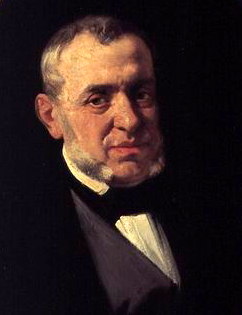
Virginia is an opera, a tragedia lirica, in three acts by composer Saverio Mercadante. The Italian libretto by Salvadore Cammarano is based on Vittorio Alfieri's tragedy of the same name. Alfieri's play was in turn taken from a story in Livy's Ab Urbe condita. Although initially written for performance in 1850 at the Teatro di San Carlo in Naples, the subject matter of Mercadante's opera was objected to by the Bourbon government censors and performance was banned outright. That decision was widely ridiculed, not just in Italy, but throughout Europe. After the fall of the Kingdom of the Two Sicilies in 1861, the ban on the opera no longer existed.

Domenico Reina was a Swiss bel canto tenor, notable for creating roles in the operas of Vincenzo Bellini, Gaetano Donizetti, Saverio Mercadante, and other Italian composers.
Raffaele Mirate was a celebrated Italian operatic tenor who had an active career from the 1830s through the 1860s. Known for his intelligent phrasing and bright and powerful vocal timbre, he was regarded as an outstanding interpreter of the tenor roles in the early and middle period operas of Giuseppe Verdi. He notably created the role of the Duke of Mantua in the world premiere of Verdi's Rigoletto in 1851. He was also a highly regarded interpreter of bel canto roles, excelling in the operas of Vincenzo Bellini, Gaetano Donizetti, and Gioachino Rossini.

Elena da Feltre is an opera in three acts by 19th-century Italian composer Saverio Mercadante from a libretto by Salvatore Cammarano, well known as librettist of Donizetti's Lucia di Lammermoor and Verdi's Il trovatore. The premiere took place at the Teatro San Carlo in Naples on 1 January 1839 as part of the Carnival Season. While not successful at the time, the opera was revived at La Scala in 1843 with twenty performances.

Raffaele Ferlotti was an Italian operatic baritone who had an active international career from the 1830s through the 1860s. He was a regular performer in Italy's leading opera houses, especially La Scala, and created roles in several world premieres. On the international stage he performed in operas in Austria, England, France, and Spain.

Erminia Frezzolini was an Italian operatic soprano. She excelled in the coloratura soprano repertoire, drawing particular acclaim in the bel canto operas of Gaetano Donizetti and Vincenzo Bellini. She was married to tenor Antonio Poggi from 1841 to 1846.
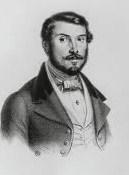
Giacomo Roppa was an Italian operatic tenor who was active career in Italy's most important opera houses from the 1830s through the 1850s. He also made appearances at the Liceu in Spain. He is best remembered for creating the role of Jacopo Foscari in the world premiere of Giuseppe Verdi's I due Foscari in 1844.

Adelaide Borghi-Mamo was an Italian operatic mezzo-soprano who had an active international career from the 1840s through the 1880s. She was married to tenor Michele Mamo and their daughter, soprano Erminia Borghi-Mamo, also had a successful singing career.

Antonio Poggi was an Italian operatic tenor who had an active international career from 1827–1848. He is best remembered for creating roles in the world premieres of operas by Gaetano Donizetti and Giuseppe Verdi. He was married to soprano Erminia Frezzolini from 1841–1846.

Teresa Brambilla was a celebrated Italian soprano most remembered today for having first interpreted the role of Gilda in Verdi's opera Rigoletto. During a career that spanned 20 years, she sang throughout Italy and in other European cities, including Paris, Barcelona and Odessa.

I due Figaro, o sia Il soggetto di una commedia is an opera in two acts by Saverio Mercadante to a libretto by Felice Romani based on Les deux Figaro by Honoré-Antoine Richaud Martelly. The opera was composed in 1826 but its production was delayed for some years due to censors' intervention.

Maria Teresa Rebecca Brambilla better known as Marietta Brambilla was an Italian contralto who sang leading roles in the opera houses of Europe from 1827 until her retirement from the stage in 1848. She is best known today for having created the roles of Maffio Orsini in Donizetti's Lucrezia Borgia and Pierotto in his Linda di Chamounix, but she also created several other roles in lesser-known works. She was the elder sister of the opera singers Teresa and Giuseppina Brambilla and the aunt of Teresina Brambilla who was also an opera singer.

Pelagio is an opera in four acts by Saverio Mercadante. The Italian-language libretto was by Marco D'Arienzo. It premiered on 12 February 1857 at the Teatro San Carlo, Naples, to great success.
Nitocri is an opera in two acts composed by Saverio Mercadante to libretto by Apostolo Zeno adapted by Lodovico Piossasco Feys. The libretto is a fictionalised account of the Egyptian queen Nitocris. The opera premiered at the Teatro Regio in Turin on 26 December 1824.
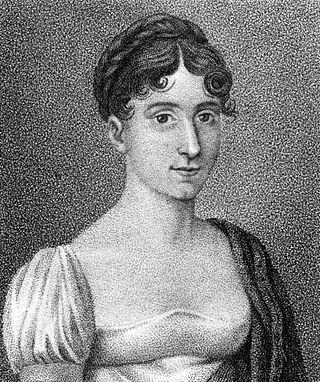
Maria Ester Mombelli was an Italian opera singer particularly known for her performances in operas by Rossini and Donizetti. She sang both soprano and mezzo-soprano roles, and often sang with her younger sister Anna.
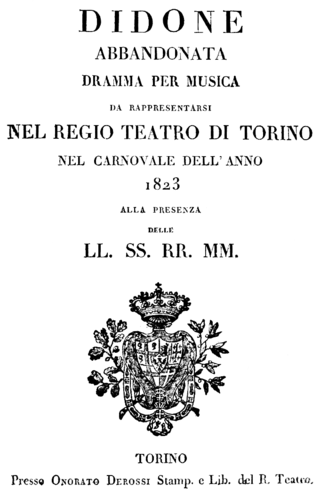
Didone abbandonata is an 1823 opera in two acts by Saverio Mercadante to a libretto by Andrea Leone Tottola after Metastasio's Didone abbandonata. It was first performed on 18 January 1823 at the Teatro Regio in Turin.














